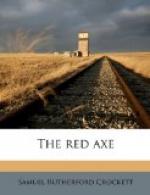So the Hussar, having finally approved of the quality of the scholastic wax, called a subordinate, and bade him guide us to the house of Bishop Peter.
In an instant we were in the familiar streets, narrow, sunken, and indescribably dirty, as they now appeared to me. For I had been accustomed to the wider, airier spaces, and to the bickering rivulets which ran down most of the steeper streets of Plassenburg, and which made it one of the cleanest towns in the world. So that the ancient and unreformed filth and wretchedness of Thorn appealed to my senses as they had never done before.
There were evidences too of the terror in which the inhabitants had long lived. The houses of the rich burghers were sadly dilapidated. No man thought it worth while to spend a pot of paint on a house which might be knocked about his ears that very night, if the Duke conceived there was money or gear to be found within the walls of it.
Here and there the same black banner appeared.
I asked the reason of it from our guide.
“Is it that the plague is in the city?”
“The plague has, indeed, been in the city—yes! But that is not the reason of the flag.”
“And what then is the meaning of the black flag?” said I.
“Ye are strangers indeed!” answered the man. “Did you not know that the great Duke Casimir is dead, and that the black flag flies for him, and must fly on the Wolfsberg till his successor be crowned.”
“And who is his successor?” said I.
“Who but young Otho, the worst of the Wolfs litter. But perhaps you are his friend?”
He turned with a keen look, like one who has been accustomed to deliver himself in company where he is sure of sympathy, and who suddenly has to consider his words in society the tone of which he is not sure of.
“Nay,” said I, “we are travelling strangers and know nothing of your politics. But this Duke Otho, wherefore has he not been crowned?”
“Because,” said the man, “the Duke Casimir, they say, hath been foully murdered, and that through the witchcraft of a woman. So by our laws, till the murderer is punished, the young Duke may not be crowned.”
By this time we were at the entering in of the long, dull mass of building, which during most of my boyhood had stood unoccupied, owing to the quarrel between Bishop Peter and the Duke. Our guide led us unchallenged into the quadrangle, and then abruptly vanished without pausing to bid us good-day, or even deigning to accept the modest gratuity which my master, the learned Doctor, had in his front pouch ready for him.
As for me, I stood holding the horses and looking about for any of my own quality who might show me the way to the stables.
Presently a long, lean, lathy youth slouched out of one of the gloomy entries. He stood amazed at the sight of me. I went to him to ask where I might bestow the horses, now standing weary-footed, hanging their heads after the long journey and the toil of the final ascent from the plain.




